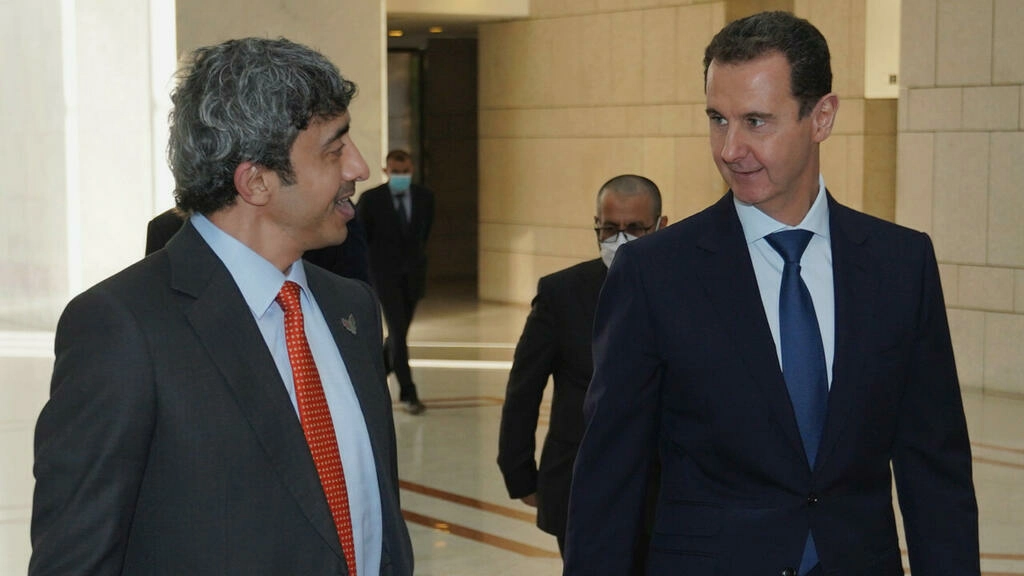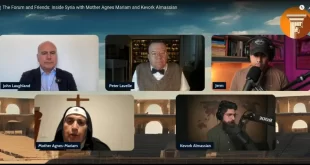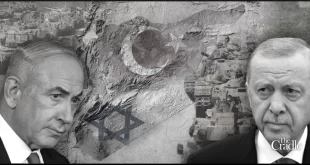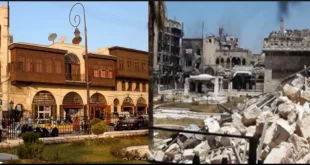
The following article, by Steven Sahiounie, is republished from Mideast Discourse:
Steven Sahiounie, journalist and political commentator
Foreign Minister Sheikh Abdullah bin Zayed, of the United Arab Emirates (UAE), visited the Syrian President Bashar al-Assad in Damascus on Tuesday. This is the most senior UAE dignitary to visit Syria since the US-NATO war on Syria for ‘regime change’ began in March 2011. The UAE had been part of the US coalition to topple the secular government of Assad, and enthrone a Muslim Brotherhood opposition member.
The ideology of Radical Islam and the status of the Muslim Brotherhood among the Arab powerhouses of Saudi Arabia and Egypt has changed in the decade of war in Syria, and a regional transition against the Muslim Brotherhood has set the stage for a transition to Syria regaining their position among their neighbors in the region.
Many Arab states backed Sunni Muslim insurgents against Assad. Similar US-NATO projects were launched in 2011, such as Libya, Egypt, and Tunisia. The Syrian people fought back and resisted the terrorists following Radical Islam, and in Egypt, a second uprising occurred to throw off the Muslim Brotherhood leader, Morsi, who had been installed by the US through vote-rigging by a Washington NGO. Tunisia is now in the process of transitioning from a Muslim Brotherhood leadership and finding its way into democracy.
The UAE delegation led by Sheikh Abdullah included Khalifa Al Marar, Minister of State, and Ali Al Shamsi, chairman of the Federal Authority for Identity, Citizenship, Customs, and Ports Security. The meeting discussed bilateral relations and cooperation with Dr. Faisal Mekdad, Minister of Foreign Affairs and Expatriates in Syria, and Mansour Fadlallah Azzam, Syria’s Minister of Presidential Affairs.
Sheikh Abdullah expressed the UAE’s desire for a stable, secure, and united Syria and its support for “all efforts made to end the Syrian crisis, consolidate stability in the country and meet the aspirations of the Syrian people for development, progress, and prosperity,” while discussing “new horizons for this cooperation, especially in vital sectors to strengthen investment partnerships in these sectors.”
Assad conveyed his greetings to President Sheikh Khalifa, Sheikh Mohammed bin Rashid, Vice President and Ruler of Dubai, and Sheikh Mohamed bin Zayed, Crown Prince of Abu Dhabi and Deputy Supreme Commander of the Armed Forces, and his wishes for the UAE’s continued development and prosperity.
Anwar Gargash, the diplomatic adviser to the UAE president, wrote on Twitter that “the UAE continues to build bridges, boost relationships, and connect what was cut off… and will be keen to spare the region further congestion and continuous conflicts.” Gargash has reflected a new political perspective on Syria, “Our position on the Syrian crisis is very clear: a few years ago we had a choice, to support Bashar Assad or the opposition, which was joined by jihadists and even many terrorist elements, and we chose to be somewhere between.”
In December 2018 the UAE reopened its embassy in Damascus, signaling to the region that the Assad government was enduring. In March this year, the UAE called for Syria to return to the Arab League, which has suspended it in November 2011. Last month, the UAE’s economy ministry said it agreed with Syria on “future plans to enhance economic cooperation and explore new sectors”, with the UAE being Syria’s most prominent global trade partner, with a 14 percent share of Syria’s foreign trade.
Abu Dhabi’s Crown Prince Sheikh Mohammed bin Zayed al-Nahyan discussed developments in Syria with Assad last month in the second call between the two leaders since March last year, while also last month economy ministers from the two countries met on the sidelines of the Dubai Expo 2020 trade fair.
“Assad has won and he’s here to stay. Nobody is going to dislodge him now, so you might as well square with the facts on the ground and mend fences with him,” said Abdulkhaleq Abdulla, a UAE political science professor with knowledge of official thinking. This renewed focus on Damascus aims at more of an Arab presence in Syria.
UAE past relationship with Syria
12 years ago, Assad stood over the tomb of the UAE’s Founding Father at Sheikh Zayed Grand Mosque, and after prayer, he wrote about Sheikh Zayed’s “great values of humanity, generosity and fraternity” in the mosque’s VIP visitor book.
A year later, President Sheikh Khalifa made an official two-day visit to the Syrian capital for talks, which was his second visit to the country after the death of Hafez Al Assad, the late president.
The following year, Assad visited Abu Dhabi again, this time meeting Sheikh Mohamed bin Zayed, Crown Prince of Abu Dhabi and Deputy Supreme Commander of the Armed Forces. At the time, the Syrian Ambassador to the UAE said the meeting underscored the warmth of relations between the two countries.
But just three years later the US-NATO attack on Syria began and the UAE closed its embassy and in August 2012, Etihad Airways suspended its three flights a day to Damascus. Syrian Air continued to operate from Abu Dhabi and Dubai, and Syrian consular services continued to operate in the UAE, indicating relations were not completely cut off.
In 2012 Sheikh Abdullah said the UAE was dedicated to supporting Syrians and their aspirations to return security and stability to their country, but he made it clear that the Emirates did not support Assad’s government.
Other Arab recent ties
In recent months, several Arab countries have begun to engage with the Syrian government, including Egypt, Jordan, and the UAE.
Jordan and Egypt, both US allies, have also taken steps toward normalizing relations since the Assad administration has defeated terrorists across much of Syria, apart from Idlib province, and the North East section.
Last month, King Abdullah of Jordan spoke with Assad for the first time in a decade, and the border between the countries was reopened for trade. The Egyptian foreign minister also met his Syrian counterpart in September, the highest-level contact between the countries since the civil war began.
The UAE, Egypt, and others see Damascus as a guard against the spread of Islamist groups in the region.
In September, energy ministers from Egypt, Syria, and Lebanon convened and agreed to a deal that would see the transportation of Egyptian gas through Jordan and Syria into Lebanon for electricity generation, a further sign of bringing Damascus back into the regional mix.
The Arab League
Egyptian Foreign Minister Sameh Shoukry said Syria could regain its status in the Arab League and fully normalize relations if it can play its “traditional role” in supporting Arab regional security. Shoukry said, “We hope it can regain its posture and play its traditional role in a way that is supportive of the peace and security of the region.”
Egypt, home of the Arab League, said Tuesday that relations should eventually be restored with Syria but that Damascus needed to first address concerns such as the humanitarian effects of the war.
The US-NATO regime change project
The Obama administration funded and supported the use of terrorists following Radical Islam in the US-NATO regime change project in Syria. Obama encouraged his Arab allies, and Israel to support the war on Syria. The UAE is one of the six Gulf Cooperation Council member states that took a tough stance against Damascus in 2012 and eventually recognized an opposition group as the representative of Syria, and their military wing, the Free Syrian Army, who were promoted by Rep. Sen. John McCain.
Obama is out of office, McCain is dead, and the Free Syrian Army no longer exists.
Astana meetings for Syria
Russian President Special Representative for the Middle East and Africa, Deputy Foreign Minister Mikhail Bogdanov said Wednesday that the 17th meeting of Astana formula on Syria should be held in the Kazakh capital of Nur-Sultan after the 20th of next December.
A meeting of the foreign ministers of the guarantor states of the Astana talks on Syria, Russia, Turkey, and Iran, could be held next month, Kazakh Foreign Minister Mukhtar Tileuberdi announced earlier on Wednesday.
“We will not normalize or upgrade our diplomatic relations with the Assad regime, nor do we support other countries normalizing or upgrading their relations, given the atrocities that this regime has inflicted on its people,” US State Department spokesman Ned Price said.
Washington has also said it will not lift sanctions, including measures that can freeze the assets of anyone dealing with Syria, regardless of nationality. Syria grapples with a spiraling economic crisis caused by years of conflict and compounded by Western sanctions which have even prevented Covid supplies and chemotherapy drugs from arriving.
Moves to rehabilitate Assad have met with disapproval, however, from the US and EU which continue to impose tight sanctions on the Syrian people, hindering foreign investment in rebuilding the country as the war is over.
Steven Sahiounie is an award-winning journalist
 Syria Support Movement solidarity with the Syrian people
Syria Support Movement solidarity with the Syrian people




